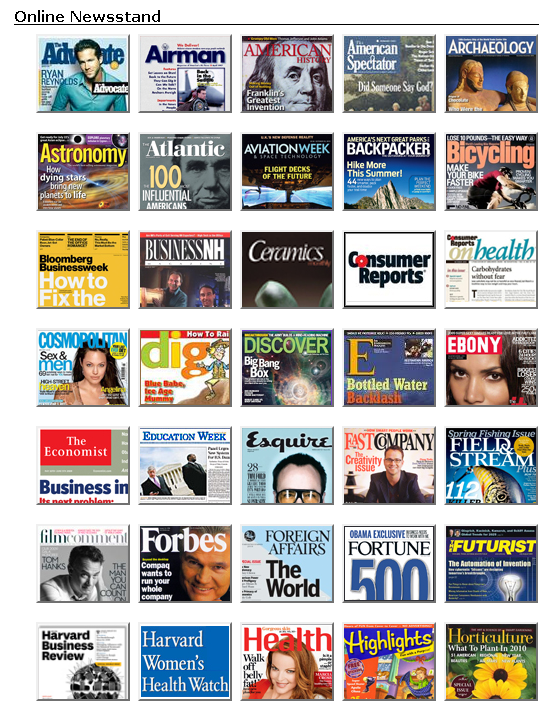A popular online newsstand devised by a New Hampshire librarian has run afoul of licensing terms and has had to be deactivated at least temporarily.
About two years ago, Steve Butzel, the assistant director of the Portsmouth Public Library, wanted to increase usage of the library’s EBSCO subscription databases. So, he created a more friendly interface that avoided obliging users to drill down into the databases. However, as the interface spread to other libraries and drew more attention, it stirred objections in some quarters.
“I received an email from a sales executive at EBSCO which informed me that what I was doing was not in keeping with the terms of the agreement that the state library of New Hampshire had with EBSCO,” Butzel said. “They said they thought it was a really nice idea, but they had been contacted by a publisher who told EBSCO it doesn’t fit into the agreement the publisher and EBSCO had agreed to,” he said. The state library contracts with EBSCO on behalf of libraries in the state.
The license agreement says that a user “may not reproduce, distribute, display, modify, transfer or transmit, in any form, or by any means, any Database or Service or any portion thereof without the prior written consent of EBSCO.”
“I figured they were right so I took it down,” said Butzel. “I just thought it was prudent until I learned more about the legal issues that I should discontinue the project, which I respectfully did,” he said. The interface was deactivated earlier this month.
Butzel and EBSCO have been talking about how to keep the project alive.
“We are working with Steve Butzel on what we hope will be an acceptable solution for everyone, but it would be inappropriate to comment further at this time,” said Steve Macrae, EBSCO’s senior director of strategic alliances.
Butzel and Macrae met on March 27 to discuss the issue.
“We seem to be in agreement that we’ll be able to devise a modified newsstand idea in order to continue the service in some manner,” Butzel said. “All things considered, I’m encouraged,” he said.
Initially, Butzel manually updated static webpages on his library’s website to include links to feature articles in each new issue of a magazine. The links he used were persistent URLs or PURLs so they never expired.
Later, he learned how to automate the process using PHP and MySQL, so that all he needed to do was enter each article’s title and accession number into his database, and the database would dynamically build the article links for him upon demand.

The online newsstand created by Steve Butzel of the Portsmouth Public Library in New Hampshire made using the library's databases a more friendly experience. A patron would simply click on a magazine cover to go to the most popular articles.
This not only saved lots of time, but it inspired him to see if he could provide the same automated service to other libraries who also subscribed to EBSCO databases. After doing a little research into how these persistent links were structured, Butzel figured out how to make it work.
In exchange for providing the service to other libraries, all he asked was for each library to pitch in on the data entry effort for one magazine. As a result, with each new library that joined the project, the newsstand added another magazine. By the time the newsstand was deactivated 58 libraries were participating.
Among the 58 participating libraries are several academic libraries, about a dozen school libraries, as well as public libraries in Ohio, Kentucky, Maine, North Carolina, Hawaii, and, of course, New Hampshire.
At the Wiggin Memorial Library in Stratham, NH, Butzel’s interface had become very popular as it made accessing the content in the EBSCO databases a more simple and less intimidating experience for users who did not have a lot of training using databases, according to Lesley Kimball the director.
“For us, it was a perfect fit since we are mostly serving people’s recreational reading needs,” Kimball said. “So being able to lay this interface on top suddenly made this product, that wasn’t being used, very attractive and popular,” she said.
Kimball, whose library had been responsible for content from the Harvard Business Review, the Atlantic Monthly, and Inc. magazine, said, while respectful of the issues being raised, she was “so disappointed” when the service went down.
“It’s hard to see how getting more access to the content is a bad thing,” she said.



That really is too bad although not surprising. I would love it if more databases where set up like this.
We have access to Ebscohost for all our staff and students and as a librarian am always looking at how we can make the service more accessible and ultimately encourage use of authoritative, reliable and relevant information. I take my hat off Steve Butzel for taking such an innovative approach, especially as so much of how we interact today is visually based. While I can understand publishers concerns it seems to me that publishers really need to work with EBSCO to provide better models of access so that their information use is maximised. I believe that most librarians and users of this information are happy to pay a fair price for access but want that access to be user friendly, flexible and timely. It is heartening to see that EBSCO is looking into how they can continue this service
The only people who really know how to get inside the databases at the P.L. where I work are the librarians. Make the magazine/journal databases more user friendly for public library patrons? NO WAY! I wonder how much extra the lawyers for EBSCO made on yelping about this one? Just my opinion.